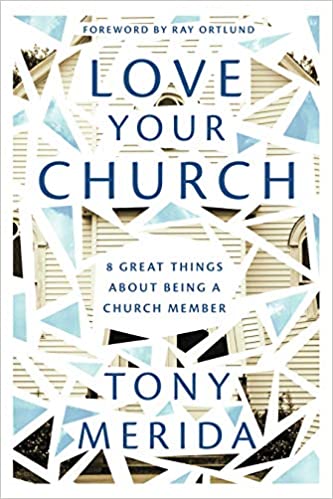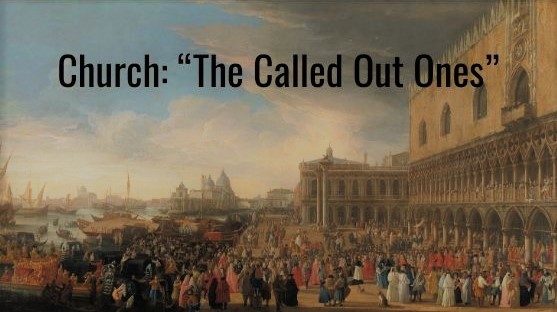There are a lot of misconceptions about the church that continue up until today. Thus, a biblical study of the church is absolutely necessary to clear them up. What does the Bible have to say about the church?
Meaning of the Word “Church”
Our English word for church is derived from the Greek adjective kuriakos, meaning, “that which belongs to the Lord.” We find this word used in the first chapter of the book of Revelation. It reads:
“I was in the Spirit on the Lord’s Day, and I heard behind me a loud voice, as of a trumpet” (Revelation 1:10).
In the context of the passage, the Lord’s Day means, “the day belonging to the Lord.” This fits well with the meaning of the term church. The church then can be defined as the company of people who profess allegiance to Jesus Christ as their Savior – they belong to the Lord.
The Church is the Ekklesia
The usual Greek word translated as “church” in the New Testament is “ekklesia.” The word comes from the Greek preposition ek meaning, “out of” and from the verb kaleo meaning, “to call.”
So, the church is a “called out group of people” or a group of “assembled people” and “ecclesiology” means a “study of the church.”

Ekklesia in the New Testament
The word ekklesia is only used three times in the gospels and over one hundred times in the remainder of the New Testament. The gospel references are all found in Matthew. The first is Jesus’ response to Peter where He said the following:
“And I also say to you that you are Peter, and on this rock, I will build My church, and the gates of Hades shall not prevail against it” (Matthew 16:18).
The word ekklesia is used here in its technical sense. It refers to those people who believe in Jesus as their Savior. In this context, it speaks of something that is yet to occur – the building of the church.
The word ekklesia is also used twice in Matthew 18:17. It says, “And if he refuses to hear them, tell it to the church. But if he refuses even to hear the church, let him be to you like a heathen and a tax collector.”
But in this instance, the word is used in a non-technical sense of Jewish assembly.
The word “church” is used only once in the gospels in the technical sense of Christian believers. In that passage, it is predicting the building of the church. Therefore, the church of Jesus Christ is still something that will be organized in the future.
The Church Doctrine Revealed by Paul
It was the Apostle Paul who revealed the doctrine of the church. He testified that God gave him that responsibility. He wrote the following to the Colossians:
“The mystery which has been hidden from ages and generations, but now has been revealed to His saints. To them, God willed to make known what are the riches of the glory of this mystery among the Gentiles: which is Christ in you, the hope of glory” (Colossians 1:26-27).
The church is a mystery or a “sacred secret” that the Apostle Paul was given the privilege of explaining to the world.
Ways the Word Church is Used in Scripture
In the New Testament, the word church is applied in several ways concerning believers.
A Group of Christians in a City
Acts 11:22 speaks of the church in the city of Jerusalem. We read:
“Then news of these things came to the ears of the church in Jerusalem, and they sent out Barnabas to go as far as Antioch.”
Acts 13:1 also talks about the church in Antioch: “Now in the church that was at Antioch there were certain prophets and teachers: Barnabas, Simeon who was called Niger, Lucius of Cyrene, Manaen who had been brought up with Herod the tetrarch, and Saul.”
There was a church in Jerusalem as well as one in Antioch.

A Particular Congregation of Believers
Paul spoke of a single congregation that met in a house. He wrote the following to the Romans.
“Greet Priscilla and Aquila, my fellow workers in Christ Jesus, who risked their own necks for my life, to whom not only I give thanks, but also all the churches of the Gentiles. Likewise, greet the church that is in their house. Greet my beloved Epaenetus, who is the firstfruits of Achaia to Christ” (Romans 16:3-5).
Paul expressed the same idea when he wrote to the church in Corinth. He said, “And if they want to learn something, let them ask their own husbands at home; for it is shameful for women to speak in church” (1 Corinthians 14:35).
Therefore, the church can be a single group of Christians who meet.
The Entire Group of Believers on Earth
At times, the word church refers to all the believers on the earth. Paul used the term in this sense when he wrote this to the Ephesians: “This is a great mystery, but I speak concerning Christ and the church” (Ephesians 5:32).
Different Usages in the NT
The word ekklesia is not always used in the New Testament of a group of believers in Jesus. The martyr Stephen spoke of the church or assembly in the wilderness.
“This is he who was in the congregation (ekklesia) in the wilderness with the Angel who spoke to him on Mount Sinai, and with our fathers, the one who received the living oracles to give to us” (Acts 7:38).
In this particular context, ekklesia is used in reference to the nation of Israel.
An Assembly of People
The word is also used for an angry mob. We read of this usage in Acts 19:32.
“Some, therefore, cried one thing and some another, for the assembly was confused, and most of them did not know why they had come together.”
It can also refer to a mere gathering of people as we read in Acts 19:39.
“But if you have any other inquiry to make, it shall be determined in the lawful assembly.”
Thus, depending upon the context, ekklesia can refer to the assembling of Israel, an unruly mob, or some secular group assembling together.
Singular and Plural Usage
We should also note that the term translated church is used in both the singular and the plural. When the church of a city or town is mentioned the word is used in the singular. When a country or nation is spoken of the word is used in the plural.
Disclaimer: As an Amazon Associate, I may earn a commission when you use any links on this page to make a purchase, but at no additional cost to you.
Recommended Resource: Love Your Church: 8 Great Things About Being a Church by Tony Merida
 How to grow in love for your church.
How to grow in love for your church.
God calls us to be “devoted to one another in love” (Romans 12:10). What does this look like for us today? How can we be the kind of church member who makes a real difference?
This timely and engaging book by Tony Merida explores what church is, why being part of it is exciting, and why it’s worthy of our love and commitment. He sets out eight privileges and responsibilities of a church member: to belong, to welcome, to gather, to care, to serve, to honor, to witness, and to send.
This is a great book for every churchgoer to read, especially as churches start to meet in person after many months of disruption from Covid-19. Whether you’re new to your local church or have been attending for some time, this book will re-energize you with God’s vision for the local church.
A discussion guide at the end of the book makes Love Your Church a great resource for reading with other church members.
The Modern Uses of the Word Church
Today, when the word church is used several things come to mind. Indeed, the term is used in at least five different ways. They include the following.
Building where Believers Gather
First, church commonly refers to the building where Christians assemble; for example, the church on Main Street. To many people, this is the first thing that is thought of when the term church is used.
Group of Local People
Second, the word refers to the local group of people that meets together. Rather than merely referring to the building or physical structure it refers to the people who meet in the building.
Christian Denomination
Third, the church is a reference to a particular Christian denomination such as the Baptist Church or the Presbyterian Church.
All Believers in Jesus
Fourth, the term is also used for all believers who profess faith in Jesus Christ. In other words, it refers to the universal church.
State Church
Finally, the term is used for a state church such as the Church of England. Therefore, according to popular usage, the word church is used in several ways.
Conclusion
Notice that the biblical usage of the term church is not exactly the same as the modern usage. Therefore, we must understand the nature of the church from a biblical perspective.
Note: This article is an excerpt taken from Don Stewart’s book on the Church.

